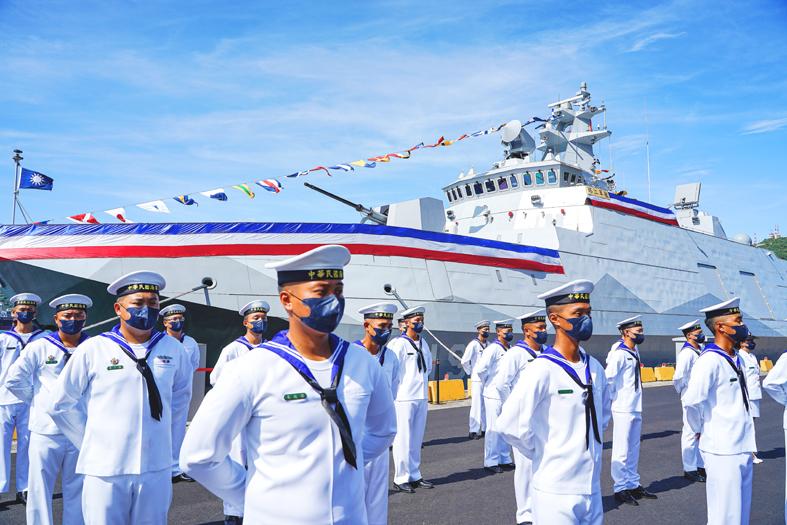The Legislative Yuan’s Budget Center has sounded the alarm over delays in the navy’s next-generation guided-missile frigate program, a source said.
The navy received NT$227 million (US$8.14 million) for the new warships over the past two fiscal years, a source familiar with a center report to lawmakers said.
The military’s top research body, the Chungshan Institute of Science and Technology, failed to meet program development milestones necessary to be awarded a contract, the source said, citing the report.

Photo: Aaron Tu, Taipei Times
This fiscal year, the navy spent only 5.8 percent of the NT$106 million allotted to the program, the source said.
Although the program’s budget for the next fiscal year has been drastically reduced from NT$1.06 billion to NT$5.72 million, the delivery schedule remains unchanged for the first frigate, the source said.
The military should improve how it evaluates the viability of armament proposals before requesting funding, the source said.
A navy spokesperson said that the COVID-19 pandemic had resulted in delays, but that project managers were working to improve program efficiency.
The naval component of the indigenous national defense program is crucial to the nation’s ability to defend its near seas, the spokesperson said, adding that the navy would spare no effort to complete the warships called for by the indigenous shipbuilding program.
The Ministry of National Defense’s budget plans show that the navy was to receive NT$24.55 billion to have the first frigate constructed by 2026.
The frigates would have state-of-the-art combat systems comparable in performance to the US’ Aegis combat system, the navy said.
The 4,500-tonne ships would use vertical systems capable of launching Tien Chien II and Hai Kung III surface-to-air missiles, it said.
The ships are necessary to fill a capability gap between the nation’s aging frigates and those of potential adversaries, such as China’s People’s Liberation Army Navy, it said.
The frigates would be used on maritime patrols to the nation’s outlying islands, as well as for protecting vital sea lanes and fisheries, escorting convoys and supporting naval drills, the navy said.

Chinese spouse and influencer Guan Guan’s (關關) residency permit has been revoked for repeatedly posting pro-China videos that threaten national security, the National Immigration Agency confirmed today. Guan Guan has said many controversial statements in her videos posted to Douyin (抖音), including “the red flag will soon be painted all over Taiwan” and “Taiwan is an inseparable part of China,” and expressing hope for expedited reunification. The agency last year received multiple reports alleging that Guan Guan had advocated for armed reunification. After verifying the reports, the agency last month issued a notice requiring her to appear and explain her actions. Guan

GIVE AND TAKE: Blood demand continues to rise each year, while fewer young donors are available due to the nation’s falling birthrate, a doctor said Blood donors can redeem points earned from donations to obtain limited edition Formosan black bear travel mugs, the Kaohsiung Blood Center said yesterday, as it announced a goal of stocking 20,000 units of blood prior to the Lunar New Year. The last month of the lunar year is National Blood Donation Month, when local centers seek to stockpile blood for use during the Lunar New Year holiday. The blood demand in southern Taiwan — including Tainan and Kaohsiung, as well as Chiayi, Pingtung, Penghu and Taitung counties — is about 2,000 units per day, the center said. The donation campaign aims to boost

The Kaohsiung Tourism Bureau audited six hotels in an effort to prevent price gouging ahead of Korean band BTS’ concert tour in the city scheduled for Nov. 19, 21 and 22 this year. The bureau on Friday said that the audits — conducted in response to allegations of unfair pricing posted on social media — found no wrongdoing. These establishments included the local branches of Chateau de Chine, Hotel Nikko, My Humble House, and Grand Hai Lai, it said, adding that the Consumer Protection Commission would have penalized price gougers had the accusations been substantiated. The bureau said the Tourism Development Act

The military yesterday said it has located the flight data recorder, or black box, of an F-16V jet that disappeared off eastern Taiwan earlier this month, and it would soon deploy a salvage team to try to retrieve it. Air Force Command Headquarters said that while it had pinned down the location of the black box, it was still searching for the aircraft’s sole pilot, air force Captain Hsin Po-yi (辛柏毅). Without providing details, the air force said it had located the black box days after detecting some intermittent signals and would now engage a team of professionals to retrieve it. The air